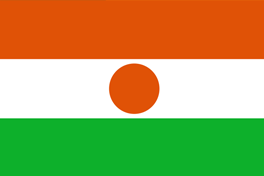 |
République du NigerIndependence 3 August 1960
History Niger is in the Sahel. The country owes its name to the river that runs through it. In Europe the country is popularized by the writings of Mungo Park (1771-1806). In the 19th century, its Hausa regions are divided between France and Great Britain. In 1900, the French establish Niger as a military territory. French becomes the administrative language and Niger becomes a colony in 1922. France then integrates it into its federation of French West Africa (AOF). In the 1950s, Niger is swept up in Africa's independence movement. France oversees the process, as the uranium-rich country is of strategic and economic importance. The progressive PPN-RDA and its candidate Hamani Diori win the December 1958 elections. Niger gains independence on 3 August 1960. The new government maintains close economic ties with France and sends the Sawaba ('freedom') opposition party into exile; for 14 years, Niger is governed by a one-party regime. When it severs colonial ties, Niger is one of West Africa's poorest countries; 80% of its population lives in rural areas. Soil erosion worsens and demographic pressures mount. Drought, famine and accusations of corruption lead to a 1974 military coup that ousts President Diori and establishes a military regime that holds power into the 1990s. Since then, Niger has remained very unstable. It has mineral resources such as gold, iron, coal, uranium and, above all, oil. The marginalized Tuaregs have demanded more autonomy. Since a 2010 coup, Niger's multicultural society has sought political, economic and social stability. Klaas van Walraven (African Studies Centre, Leiden) |


